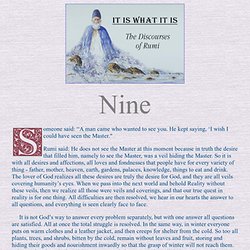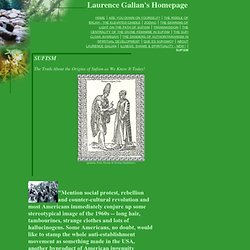

Mevlana Rumi: Ecstasy And Order. The 30th of September this year marks the 800th birth anniversary of one of the greatest Sufi mystic poet of Islam, Mevelana Hazrat Jalaluddin Rumi.

In honor of Mevlana’s 800th birthday, UNESCO has declared 2007 to be the Year of Mevlana – a year of love and understanding.The name Mevlana Jalaluddin Rumi stands for an ecstatic flight into the infinite love. Everything other than love for the most beautiful God Though it be sugar- eating. What is agony of the spirit? To advance toward death without seizing hold of the Water of Life.- Rumi Mevlana Jalal al-Din al-Rumi was born 6 Rabi’al-Awwal 604 (30 September 1207) in Balkh, a town in the north of Afghanistan.
Rumi's Poetry. The Bektashi Order of Sufi Dervishes. During the 2nd century of the Christian Era, Illyria (part of which is modern Albania) was Christianised.

In 732 Pope Gregory III placed the Albanian churches under the leadership of the patriarch of Constantinople. AHMED HULUSI WEB SITE. Moments With Shams. Sufi Poetry. Updated: 7-Apr-2014 A few poems from each of the following authors are included here as examples of the wondrous depth and variety of Sufi poetry: Attar Hafiz Jami Rumi Saadi Sanai Yunus Emry Shabistari Ansari Rabi'a Abil Kheir Sultan Bahu Ibn 'Arabi Baba Kuhi Mansur al-Hallaj Amir Khusrau Moinuddin Hasan Chishti Hazret-i Uftade Attar of Nishapur(1145 - 1221 ce) saint and mystic, one of the most voluminous authors in Persian literature on religious topics.

His best-known work, Conference of the Birds, is an elaborate allegory of the soul's quest for reunion with God So long as we do not die to ourselves, and so long as we identify with someone or something, we shall never be free. Farid ud Din Attar Strive to discover the mystery before life is taken from you. Levels of Nafs. Mevlana Rumi: Ecstasy And Order. Rumi and Shams. The Greatest MeetingThe Life Stories of Rumi and Shams-e Tabrizi: Their Tumultuous Times by Majid Amini FOREWORD Delving into an in-depth discussion and analysis regarding the Erfân, Tasavvof, and Sufigary, which in the West, are often collectively referred to as Mysticism, Gnosticism, Sufism, or sometimes Dervishes’ thoughts, would have been beyond the scope of this work titled, “The Greatest Meeting”.

Among the numerous books that have appeared in the West in the past few decades (mostly inept translations of Rumi’s poetry, or a few scholarly works on his life and time), it is challenging if not impossible to find a clear and convincing definition for these schools of thought. Mevlana Celaleddin Rumi, the great Anatolian philosopher and the father of the Mevlevi sect. Rumi Nine. Nine omeone said: “A man came who wanted to see you.

He kept saying, ‘I wish I could have seen the Master. " Rumi said: He does not see the Master at this moment because in truth the desire that filled him, namely to see the Master, was a veil hiding the Master. So it is with all desires and affections, all loves and fondnesses that people have for every variety of thing - father, mother, heaven, earth, gardens, palaces, knowledge, things to eat and drink. The lover of God realizes all these desires are truly the desire for God, and they are all veils covering humanity’s eyes. It is not God’s way to answer every problem separately, but with one answer all questions are satisfied.
God has created these veils for a good purpose. Look at the sun. When God reveals Itself through a veil to the mountain, those slopes become fully arrayed in trees and flowers and verdure. Someone asked: “Well, isn’t this the same sun in the winter?” Rumi answered: Our purpose here was to draw a comparison. SUFISM. Ahmet Karamustafa, Ph.D., associate professor of Islamic thought and Turkish literature in Arts and Sciences, would beg to differ.

Those who think of hippies as an American icon might gain valuable insight, he suggests, by reading his treatise on the Qalandars, a 13th-century Islamic dervish movement that also favored tambourines and psychoactive drugs, not to mention drums and naked revelry. Among dervishes, he explains, such bizarre anti-establishment behavior was considered an intensely spiritual act of pious self-denial, an outward sign of disdain for earthly societal norms. It's an intellectual tidbit that might prove useful to anyone seeking answers to social unrest in the '60s.
"I think we in the modern world are all a bit too arrogant at times," Karamustafa said. "We're much too quick to write off whole chapters of human history as intellectually unimportant or irrelevant, when in truth, we have much to learn from thinkers who came long before us. So togged up. The Threshold Society?&?The Mevlevi Order.
Rumi and Shams.